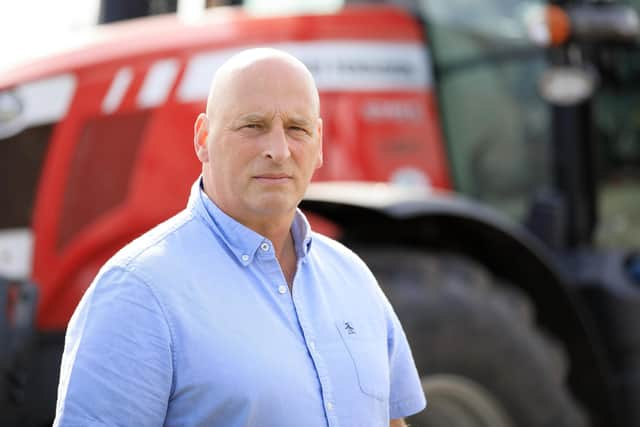Cost of living crisis: Dysfunctional food system which is not sustainable for farmers needs to be fixed says Ulster Farmers Union
and live on Freeview channel 276
It comes as Chancellor Jeremy Hunt has backed interest rate hikes being used to calm soaring inflation even if they increase the risk of pushing the UK into recession.
The UFU has said that food prices remain 19% higher than last year, but farm gate prices have not kept up with the pace.
Advertisement
Hide AdAdvertisement
Hide AdUFU deputy president John McLenaghan said: “There has been a lot of coverage recently about food prices coming down, but since food inflation began off the back of the war in Ukraine, farm gate prices have lagged behind.


"Meanwhile, input prices rose, increasing the cost of food production and today, feed, fertiliser and energy prices remain high. The gap between the price of food consumers pay and what farmers receive for their produce is vast and highlights a dysfunction in our food system. Even more so, retailers and feed and fertiliser importers recently revealed major profits over the past year.
“The major issue is that if farm businesses aren’t financially viable, output will decrease, food supply will decrease. The food system as it is, is not sustainable which impacts us all.”
He added: “There is a big focus on farms being environmentally stable and rightly so, however, there is a lot less talk about farming needing to be economically sustainable. This is extremely important too and critical to food security.”
Advertisement
Hide AdAdvertisement
Hide AdMr McLenaghan said that press coverage highlighting that food prices are rising at a higher rate than inflation over the past year is misleading.
He explained: “For the past two decades, food prices have been fairly static and are only catching up with inflation now. This isn’t sustainable but a cheap food policy is not the answer either.
“In the current food system, farmers are ‘price-takers’ because they cannot set the price for their produce making them extremely vulnerable when difficult times arise like the current cost-of-living crisis.
"To date, they have been forced to absorb the extra expense like it’s solely their responsibility which is wrong when others in the supply chain are making large amounts of money. Farmers may produce food, but it’s always forgotten that they’re consumers too, managing the same rising house bills coupled with increasing farm business expenses.
Advertisement
Hide AdAdvertisement
Hide Ad"It’s simply impossible for farmers to sustain this in the long term, and the only solution to protect our local food security is a robust food system that works for everyone.”
Meanwhile, UK retailers have seen sales return to growth in April as shoppers continued to spend despite continued high inflation, according to official figures.
Supermarkets were among retailers to report higher sales despite food inflation remaining close to a 45-year-high.
The Office for National Statistics revealed that retail sales volumes increased by 0.5% last month, following a fall of 1.2% in March.
Advertisement
Hide AdAdvertisement
Hide AdThere was more positive news for households during the cost of living as home heating oil continues to fall – the average cost of 900 litres is now under £500 for first time since January 13, 2022.
And the average price of petrol has fallen below 140p per litre for the first time since October 22, 2021.